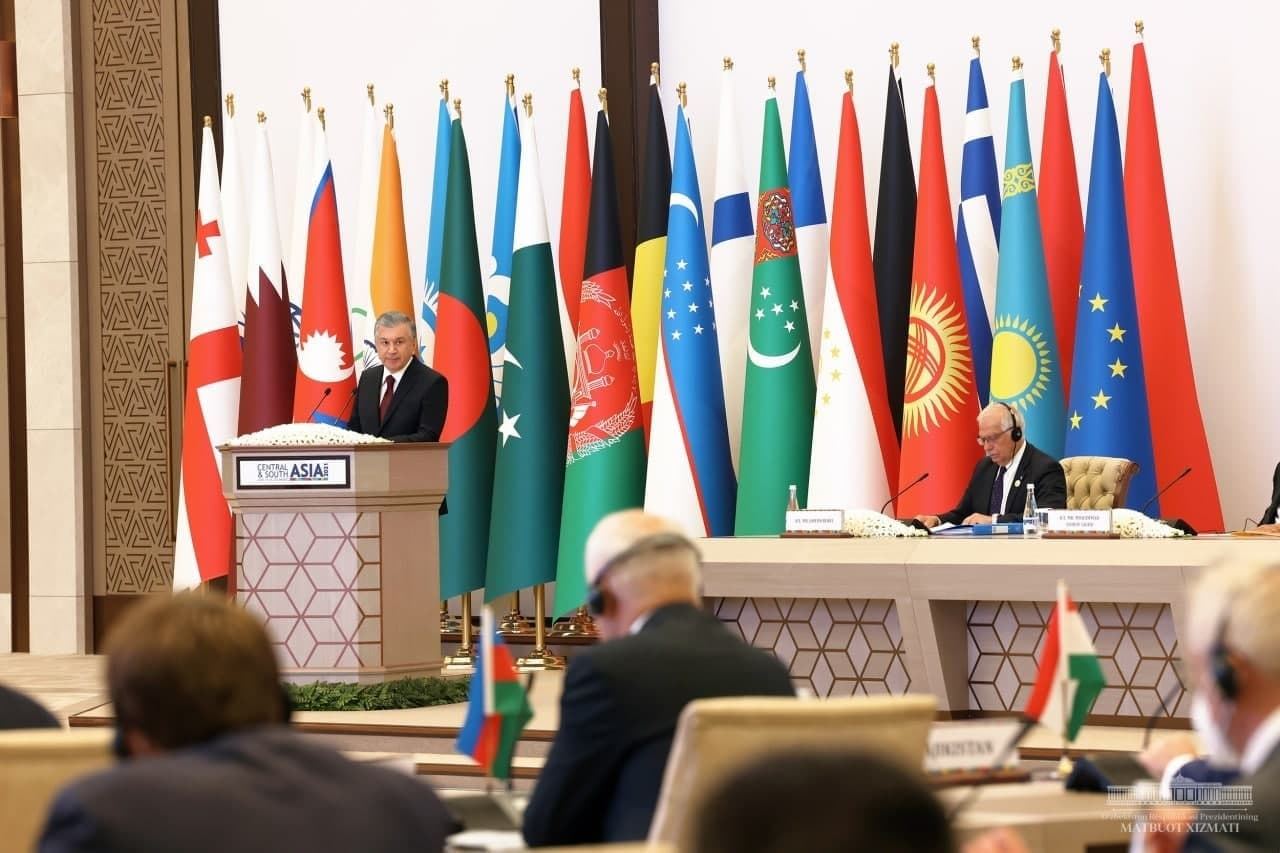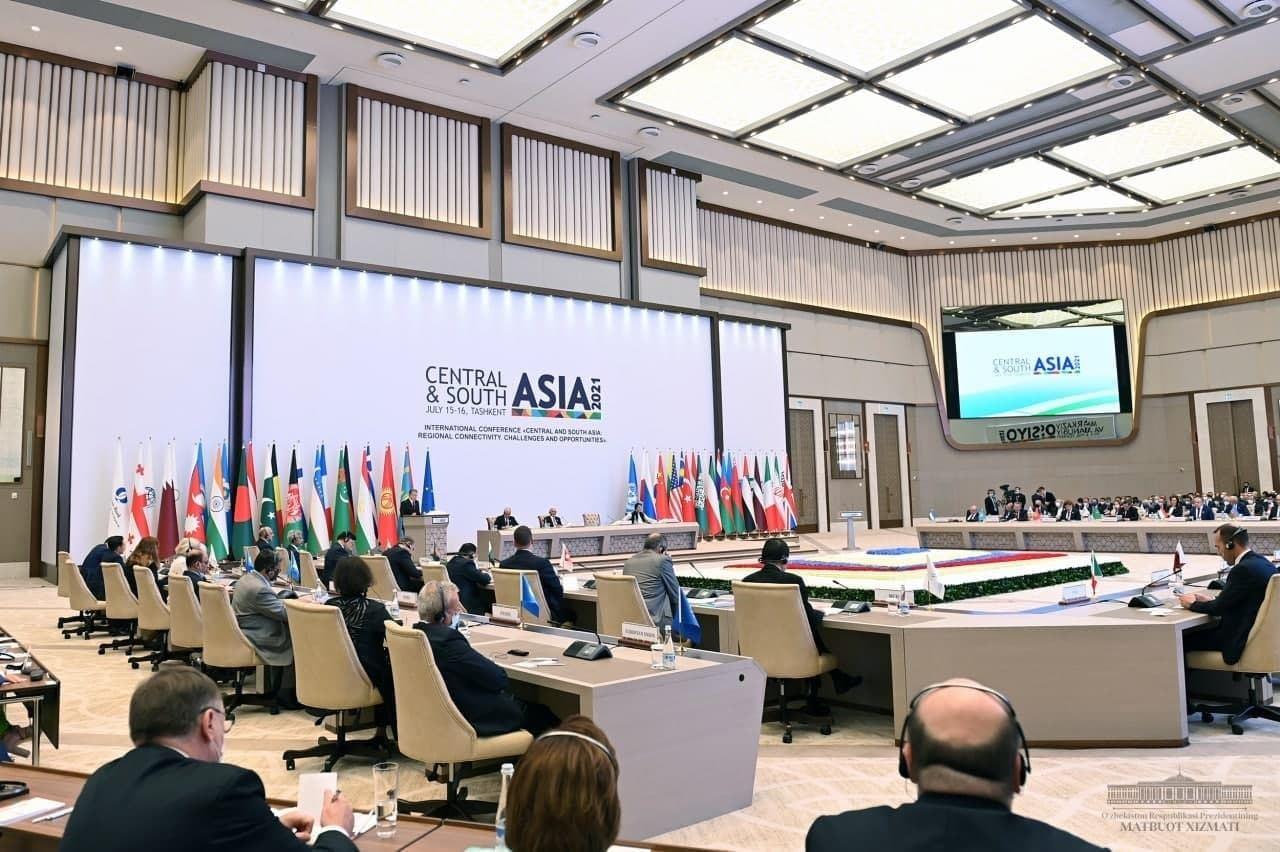On Thursday, the International Conference “Central and South Asia: Regional Connectivity. Challenges and Opportunities” kicked off in Uzbekistan's capital Tashkent.
The conference will be held from July 15-16 at the initiative of Uzbekistan President Shavkat Mirziyoyev.
Mirziyoyev was keen to welcome all the participants in the International Conference as well as to express his great gratitude to the UN Secretary-General Mr. António Guterres for supporting the forum.
The president also extended his deep respect to the President of the Islamic Republic of Afghanistan His Excellency Mr. Ashraf Ghani and the Prime Minister of the Islamic Republic of Pakistan His Excellency Mr.Imran Khan.
“Taking this opportunity, I thank the foreign ministers and high-ranking representatives of our major partner countries, the heads of respectful international and regional organizations, and leading financial institutions taking a personal part in the conference,” he stated.
The president also noted that despite the challenging conditions of the pandemic, the attendees' participation in the forum is a clear confirmation of the profound attention and resolute attitude to develop bilateral and regional cooperation.

He pointed out that central and South Asia for centuries has fostered an active dialogue between peoples and civilizations.
“Thanks to close cooperation between the two regions, the new knowledge, and philosophical ideas, attainments in medicine and astronomy, geography and mathematics, geodesy and architecture, the arts of diplomacy and public administration, high cultural and spiritual-moral value have spread,” he added.
The president continued: “For a number of times, the people of our regions used to live in the framework of common state formations, as well as a common political, economic and humanitarian space,”.
“Here appeared the Harappan Civilization, the Greco-Bactrian, and Kushan empires, the Turkic Khaganate, Khorasan, Maverannakhr, the Ghaznavids, Timurids and Baburids states and others, who left a deep mark in the history of mankind,” he added.
Mirziyoyev noted that Central and South Asia have always been closely linked by reliable trade arteries and served as a bridge for the countries of the Middle East, Europe, and China.
He added that it was mentioned in the works of the ancient Greek historian Strabo, who wrote that by the Oxus River (now Amudarya): “The goods were delivered through the Caspian and Black Seas to Europe”.
“Yet back in the third and second millennia B.C., a network of trade routes connecting us passed through the Khyber and Bolan passes,” the president pointed out.

Mirziyoyev noted that in Central and South Asia, the mutual influence of religions such as Islam, Buddhism, Hinduism and unique folk traditions has contributed to the aggregation of unique ethnocultural communities and formed a perse and rich culture of the East.
He added that the close contacts between our peoples paved the way to vibrant intellectual and spiritual progress.
The president noted: “As a result, the world has gained outstanding scholars and thinkers such as Charaka, Sushruta, Brahmagupta, Al-Khorezmi, Al-Fergani, Farabi, Biruni, Avicena, and many others”.
He noted that they pre-determined the development of scientific and philosophical thought for several centuries to come, adding: "The works of such classics of our national literatures as, first of all, Khosrow Dehlavi, Alisher Navoi, Abdurakhman Jami, Muhammad Haydar, Mahtumkuli, MirzoGolib, Abay, Rabindranath Tagore, Sadriddin Ayni, and Chingiz Aitmatov are well-known all over the world,”.
The president also highlighted that that they have made an enormous contribution to the development of ideas of peace, freedom and humanism, friendship, and mutual understanding among various nations.
He added that the works of such great scientists as Abu Raihan Beruni and Zahiriddin Muhammad Babur are considered to be the true encyclopedias on the history, science, and culture of Central and South Asia regions.
Mirziyoyev stated that it is widely known that the characterization given to Babur by the first Prime Minister of India Jawaharlal Nehru was: “He was a charming person, a typical King of the Renaissance”.
He noted that the Babur wrote, in his fundamental work “Baburname” that there was a regular caravan route in the sixteenth century between India and Central Asia through the territory of Afghanistan, on which thousands of camels transported various goods every year.
“According to his orders, alongside the trade routes the caravanserais were improved and wells were constructed. Babur’s grandson, Akbar the Great, by continuing his cause, has also left a bright imprint in India’s history as a tolerant and visionary ruler,” the president added.
Mirziyoyev noted that the trade relations of Central and South Asia were undertaken at that time with Iran, Arabia, the Ottoman State, China, Russia, and other countries.
In the nineteenth century, due to historical circumstances, the connectivity between the two neighboring regions was disrupted. Between Central and South Asia, various obstacles emerged, borders were closed, tensions became more acute which have frequently led to conflicts.
The era of cooperation and understanding has given way to a period of confrontation and mistrust.
“We have been still feeling its negative consequences– there are no effective transboundary routes, the trade-economic ties are poorly developed and the potential of the cultural-humanitarian relations has not been put into effectual,” the president added.
As the world entered an era of global geopolitical transformations associated with both challenges and new opportunities. The revival of mutual ties between Central and South Asia with a population of about two billion is becoming a demanded and objective process.
Mirziyoyev stated that it is a high time – proceeding from an enormous historical, scientific, and spiritual-cultural heritage of our peoples, the complementarity of economies, and intellectual capacity to consolidate our joint efforts, which will undoubtedly have a powerful synergy effect.
“We realize that the connectivity, cooperation, dialogue, and most importantly, trust are a driving force to ensure stability and sustainable development, improvement of the living standards, and well-being of the peoples of our regions,” he noted.
The president added that all of this created necessary prerequisites for the formation of a space for interregional cooperation and partnership, free from conflict and socio-economic shocks as well as a vast market for goods and services, investments, and innovations.
He shared that they have pursued the following ideas:
- First, strengthening peace and friendship, trust and good- neighborliness, enhancing the mutually beneficial cooperation between our countries, building an open and constructive policy meet the common interests of all Central and South Asian states.
- Second, we stand for the creation of sustainable trade, economic, and transport communication links, which should become the main driver for the further development of our countries and the entire region for the long term perspective.
- Third, one of the key links of the practical connectivity of Central and South Asia is the Islamic Republic of Afghanistan.
The president shared his confidence that the active and constructive dialogue between the countries of Central and South Asia will open up new opportunities for fuller accomplishment of their trade-economic, cultural and civilizational potential.
He also proposed the following:
- First: Our priority task is to create conducive conditions for the development of trade and economic ties, and the growth of mutual investments.
- Second: The development of modern, effective, and secure transport and logistics infrastructure in Central and South Asia.
Third: Introducing the digital platforms must become a locomotive of the economic cooperation of the countries ofCentralandSouthAsia.
- Fourth: Jointly seeking ways of ensuring food security in our vast region.
- Fifth: The consolidation of the efforts in terms of counteracting common challenges and threats to stability and security. Together we can more effectively counteract terrorism, extremism, and transnational crime including in the cyber-space.
- Sixth: The issues of ecology and stimulation of the «green» development require the closest attention.
- Seventh: We stand for a fuller development of the unique tourism potential of Central and South Asia.
- Eighth: The expansion of scientific, cultural, and humanitarian exchanges is one of the important conditions for strengthening friendship and trust.
- Ninth: The high achievements of science, technology, and innovations are an important factor in the accelerated development of our countries.
- Tenth: At present, it is more important than ever that we develop sound solutions based on a systematic study and analysis of the development trends and connectivity of our regions.
The president proposed to develop the Joint Anti-Drug Action Plan with the participation of the UNOffice on Drugs and Crime.
He also highlighted an important point, which is coordinated efforts are needed in the fight against the threat of terrorism.
"We are ready to organize a special meeting of experts on these issues with the participation of the representatives of two regions," he pointed out.
The president added: "This meeting could take place on the sidelines of the international conference due next November in Tashkent to mark the tenth anniversary of the Joint Action Plan for the implementation of the United Nations Global Counter-Terrorism Strategy in Central Asia,".
He also proposed to create a program for Central and SouthAsia in the framework of the World Tourism Organization to promote the historical and cultural heritage of the peoples.
Mirziyoyev also proposes to conduct in Termez city of Uzbekistan an international forum entitled "The Historical Heritage of Central and South Asia", under the auspices of UNESCO.
“The International Institute for Central Asia was opened on the eve of our Forum. We propose to create a permanent Expert Panel of prominent scientists and researchers from our countries on the basis of this analytical center to promote regional cooperation,” he added.
Mirziyoyev also proposed to develop and submit to the UN General Assembly a draft of the special resolution on strengthening connectivity between Central and South Asia, and in general, throughout the Eurasian continent, as an important factor of stable and sustainable development.
“The common approaches, fundamental principles, and directions for our dialogue should be enshrined in this document. It is also expedient to reflect in the draft resolution our readiness to hold regular high-level forums on the regional connectivity of the countries of South and Central Asia,” he added.
The president was also keen to underscore that the forum is taking place at an important historical time in the formation and development of a new Uzbekistan.
He noted that the country has been consistently implementing the systemic democratic forms in all areas of public life, adding: “They are comprehensive and irreversible. This is the fundamental choice of our people,”.
The president highlighted that the main achievement of Uzbekistan’s foreign policy became the crucial changes in the development of good-neighborly relations in Central Asia–with Kazakhstan, Kyrgyzstan, Tajikistan, and Turkmenistan.
Mirziyoyev continued: “Together we have succeeded in creating a completely new atmosphere of trust and mutual support in our region. We have created an effective platform for regular dialogue and joint identification of ‘newpoints’ and drivers of growth,”
“We plan to hold the next Consultative Meetings of the Heads of State of Central Asia in Turkmenistan in early August,” he added.
The president underscored that Uzbekistan is a reliable, stable, and predictable partner aimed at developing constructive and mutually beneficial cooperation.
Mirziyoyev stated that the historical and civilizational commonality of Central and South Asia, coinciding interests of their countries and peoples is a solid foundation on which they can build a prosperous common future.
He added: “It is time to realize that without strengthened cooperation, effective regional interconnectedness we will not be able to overcome the challenges that our countries are facing today,”.
“We need to shape a clear vision of the prospects for shared sustainable development and prosperity. Together, we must transform Central and South Asia, and our entire Eurasian continent, into a stable, economically developed, and prosperous space.” the president stated.












